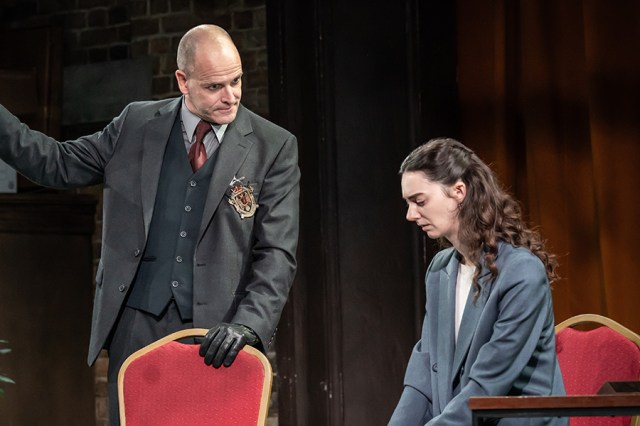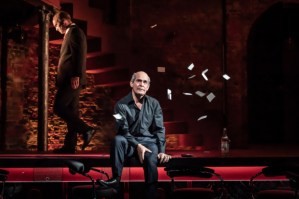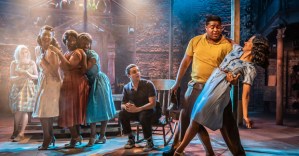
Sam Holcroft’s new play A Mirror is bold, inventive and original. It is also annoying and a bit messy around the edges. I loved it, but felt I could not, admired it, yet was irritated by some of its qualities.
Perhaps that slipperiness of reaction is precisely what Holcroft and the director Jeremy Herrin are after. This is a production of deliberate rough edges. Since one of its aims is to ask questions about the significance and reality of theatre itself, that is as it should be.
Holcroft was inspired to write the play after a holiday in North Korea and what the audience enters at first, is a theatre emblazoned in flowers and lights as if for one of those grand Korean weddings. But very quickly the ceremony is revealed to be a sham; as soon as a grey-uniformed apparatchik is out of the way, master of ceremonies Jonny Lee Miller sweeps away the wedding trappings of Max Jones’s set and announces that we are the audience for a play, presented without licence.
Then we are off, on a journey of discovery, a hall of mirrors, that takes us into a series of intricate boxes, of plays within plays, where nothing is quite as it seems. Part of the impact comes from the surprises Holcroft delivers, so it’s important to avoid spoilers, but the first scene we witness is between the ambitious deputy minister of culture Čelik (Miller) and a soldier-turned-mechanic turned wannabe-playwright called Adem, played with gentle but steely sincerity by Micheal Ward. “My job is to know the breaking point of things,” he says, cryptically.
Adem has submitted a play that is full of talent, but impossible to stage under a repressive regime because it is a word-for-word record of the reality of life in his apartment block, complete with “prostitution, drug dealing, gambling, child neglect, and attempted suicide and a compulsive masturbator perforating his bowel with a chair leg up his rectum.”
Čelik is shocked but also intrigued. He sees his role as cultivating talent of the sort that can bring a new kind of society into being. He wants heroes, inspiration. “A mirror is not a painting,” he says. “We are trying to illuminate things.” Naturally in this kind of depiction of art, drama is not documentary, truth is not reality, and we are sailing pretty close to Orwellian double-speak.
Added into this initial encounter are a nervous assistant Mei (Tanya Reynolds) who is introduced to the joys of Shakespeare by her enamoured boss, and a dissolute playwright Bax (Geoffrey Streatfeild) who has conformed to the regime’s strictures to find success.
This is all presented by Holcroft with a kind of glee. The events we see unfolding are often very funny; Streatfeild in particular has great fun with the obnoxious Bax, the kind of man who always stands too close to everybody and is so puffed up with his own sense of importance that he believes he is irresistible. But because everybody is both inside and outside the action, he also maps intelligence and dawning self-knowledge.
The direction is similarly knowing, but also direct and clear. It would be easy to get lost in the intricate set of subtexts that Holcroft is building, but Herrin’s vision holds it all together, allowing meaning to emerge without forcing it.
Some aspects of this creation of a totalitarian regime feel a bit like a school production; I found I sometimes longed for the sheer terror that Harold Pinter could induce when dealing, much more succinctly, with similar themes of censorship and expression. But I suspect that is part of Holcroft’s purpose. She also wrote the equally inventive Rules for Living, and she is constantly aware of the unreality of what she does.
She isn’t just writing about countries far away and different, but also about the difficulties of artistic expression per se; about whether writing plays is a grown-up pursuit and about who holds the power over what we see and what we don’t. There’s a teasing sense that she also has in her satirical aim any overweening gatekeepers, especially if they are male, white and stale.
In this context Reynold’s performance as the awkward Mei, constantly negotiating situations where she is made to feel uncomfortable is not just comic, but also truthful. Top Boy star Ward, in his stage debut, is also revelatory; his stillness and the gentle incomprehension in his eyes as Adem continues to confound all expectations holds the centre of the play still.
They are all excellent, and in every case, when the story takes its final turn, you realise how many layers are held within each performance. Miller, who hasn’t been seen on stage since he played in the Almeida production of Ink on Broadway four years ago, relishes his return. He makes Čelik both frightening and charming, nervous and threatening, a sly smile passing across his face as he flings himself into reading Adem’s scripts, a sense of passion distorted. Like the entire play, he is multi-faceted. You never quite know where you are.















